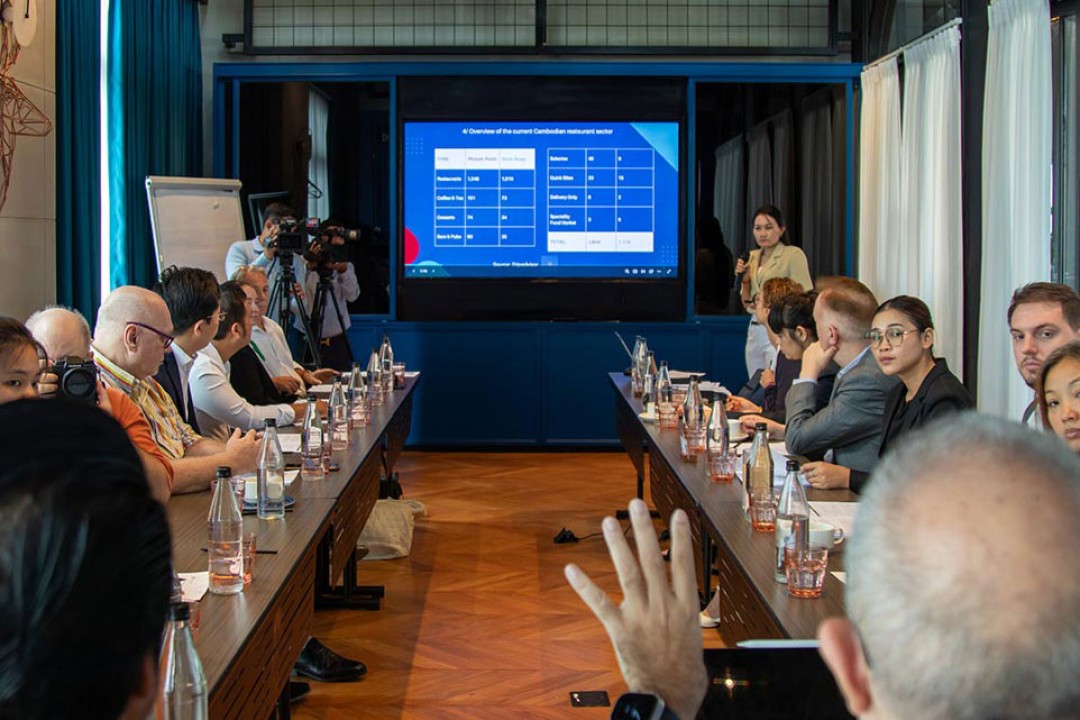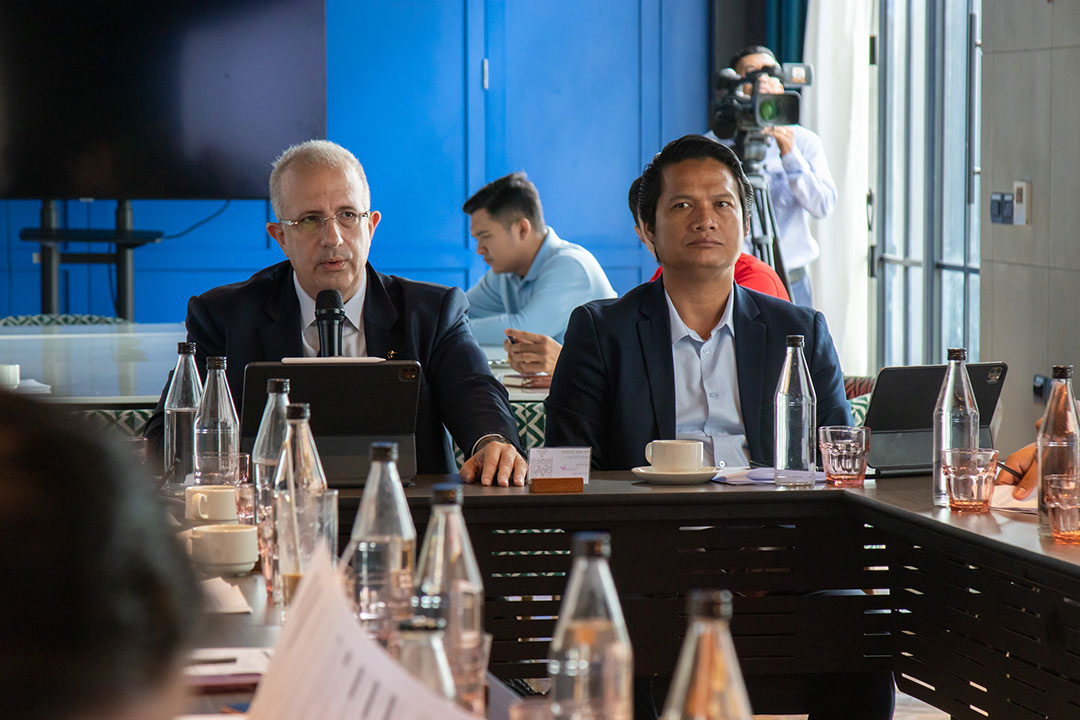Cambodia Restaurant Association Releases Results Of Comprehensive Survey Analysing Cambodia's Restaurant Industry

The Cambodia Restaurant Association (CRA) recently undertook a comprehensive survey to delve into the myriad challenges confronting the restaurant sector.
A press conference sharing the preliminary results of the survey was held on June 11, 2024 at the TRIBE Hotel Phnom Penh. According to the CRA, the survey's main aim is to provide a robust data foundation to lobby the government for more targeted support, highlighting critical areas where intervention could make a substantial difference.
Background: Economic Outlook For Cambodia And ASEAN 2024
Cambodia’s economy has demonstrated resilience amidst global economic turbulence, with projections indicating a GDP growth rate of 5.4 per cent in 2024. This recovery, however, is uneven across sectors.
While manufacturing and construction are rebounding, the service sector, particularly restaurants, remains vulnerable. Inflationary pressures, supply chain disruptions, and fluctuating consumer confidence are compounding the difficulties faced by restaurateurs.
Tourism, a vital pillar of Cambodia’s economy, is gradually recovering, however, still remains well below pre-pandemic levels. Mixed economic recovery can be seen in the broader ASEAN region, with countries like Singapore and Thailand seeing robust rebounds in tourism and service sectors, while others are still contending with the pandemic's long tail effects.
The CRA indicated that the ASEAN Travel Corridor Arrangement Framework (ATCAF) – designed to facilitate safer and smoother travel within the region – is expected to further boost tourism numbers, but full recovery is likely to be gradual, contingent on global travel trends and the management of new COVID-19 variants.

Cambodia Restaurant Association Survey Findings 2024
Conducted from May 30 to June 4, 2024, the CRA's survey gathered responses from 118 restaurant operators across various segments of the industry, providing a granular view of the sector’s current state.
Most respondents are based in Phnom Penh (82.2 per cent), followed by Siem Reap (28 per cent), Sihanoukville (25.4 per cent), and Battambang (17.8 per cent) (the percentages add up to more than 100 as some respondents have establishments in more than one location).
Restaurant Profile And Cuisine Types
The survey revealed a diverse landscape of restaurant types in Cambodia:
- Casual Dining and Fine Dining: Both segments accounted for 33.1 per cent of the respondents each, highlighting their significant presence in the Cambodian market.
- Fast Food: Represented 25.4 per cent of respondents, reflecting the growing demand for quick service options.
- Café/Bistro: Comprising 13.6 per cent, indicating a niche but stable market segment.
- Other Types: Made up 14.4 per cent, showcasing the variety and innovation within the sector.
Western cuisine was the most prominent among survey respondents, with 51.7 per cent saying they primarily serve Western dishes at their establishments. This was followed by Asian (28.8 per cent), Fusion (13.6 per cent), and Cambodian cuisine (8.5 per cent).
Operational Challenges
A significant portion of respondents (72.9 per cent) have been in operation for more than five years, indicating that well-established businesses are facing unprecedented challenges. The survey results show a stark picture:
- Revenue Trends: 44.1 per cent reported a significant decrease in revenue over the past year. This decline is reflective of broader economic pressures and reduced consumer spending.
- Monthly Revenue: 41.5 per cent experienced a steady decline in monthly revenue, with only 4.2 per cent seeing a steady increase.
- Customer Footfall: 42.4 per cent noted a significant drop in customer traffic, exacerbating financial pressures.
Operating costs have risen for many, with 34.7 per cent reporting slight increases and 27.1 per cent significant increases. Rent (66.1 per cent) and the cost of goods sold (64.4 per cent) were the most cited burdens. Consequently, profit margins have shrunk significantly for 41.5 per cent of respondents, highlighting the critical financial strain on the sector.
Financial Health And Market Conditions
Debt levels have surged, with 33.1 per cent experiencing a slight increase and 27.1 per cent a significant rise. Managing this debt has been very challenging for 42.4 per cent of respondents, indicating a precarious financial situation. Access to loans or credit remains difficult, with only 53.6 per cent managing to secure financing, often under neutral or unfavorable terms.
Competition has intensified, with 37.3 per cent reporting a significant increase in competitors. This heightened competition is coupled with changing consumer spending habits, where 83.1 per cent of respondents report decreased spending by customers. The mixed impact of tourism is also notable; while 31.4 per cent see positive effects, an equal proportion (31.4 per cent) report negative impacts, with 37.3 per cent seeing no impact at all.
WATCH: Arnaud Darc, President of the CRA, points to a lack of skilled labour as
one significant challenge faced by the restaurant industry in Cambodia:
Environmental And Social Factors
There is a commendable commitment to sustainability, with 85.6 per cent of respondents adopting eco-friendly practices. However, the cost and availability of materials remain significant barriers.
Community engagement is strong, with 60.2 per cent involved in local initiatives and 52.5 per cent reporting positive impacts from community support.
Future Outlook And Support Needs
The outlook for the future is cautious. Only 19.5 per cent of respondents are very confident about their business growth over the next year. Investment plans are conservative, with 55.9 per cent not planning any expansions. Innovations such as new menu items (67.8 per cent) and promotions (64.4 per cent) have been widely implemented, but their success remains moderate.
The survey underscores the need for government intervention, with tax relief (79.7 per cent) and marketing support (69.5 per cent) identified as the most beneficial forms of assistance.
A reduction in VAT from 10 to 5 per cent is a common plea among respondents, aimed at alleviating financial burdens and stimulating consumer spending.
A Call For Action And Need For Government Support
Arnaud Darc, President of the Cambodia Restaurant Association, emphasised the urgency of the situation during the press conference, stating:
The restaurant sector is at a critical juncture. Despite our resilience and adaptability, the current economic pressures are unsustainable without targeted government support. This survey highlights the pressing need for tax relief and financial aid to ensure the survival and revival of our industry.

As Cambodia's restaurant industry continues to grapple with severe financial and operational difficulties, the CRA believe that there is a compelling case for targeted government support, particularly in the form of tax relief and financial aid, offering the results of this survey as a starting foundation for lobbying efforts.
Darc shared that the CRA previously led two surveys conducted by the Cambodia Tourism Federation in 2020 and 2022 that succeeded in gaining government support for tax relief and unemployment benefit.
He added that the results of the CRA's 2024 survey will soon be officially disseminated to relevant government ministries, CRA members and the broader restaurant industry. The CRA hopes to conduct this survey on a yearly basis.
This article was adapted from a supplied press release.